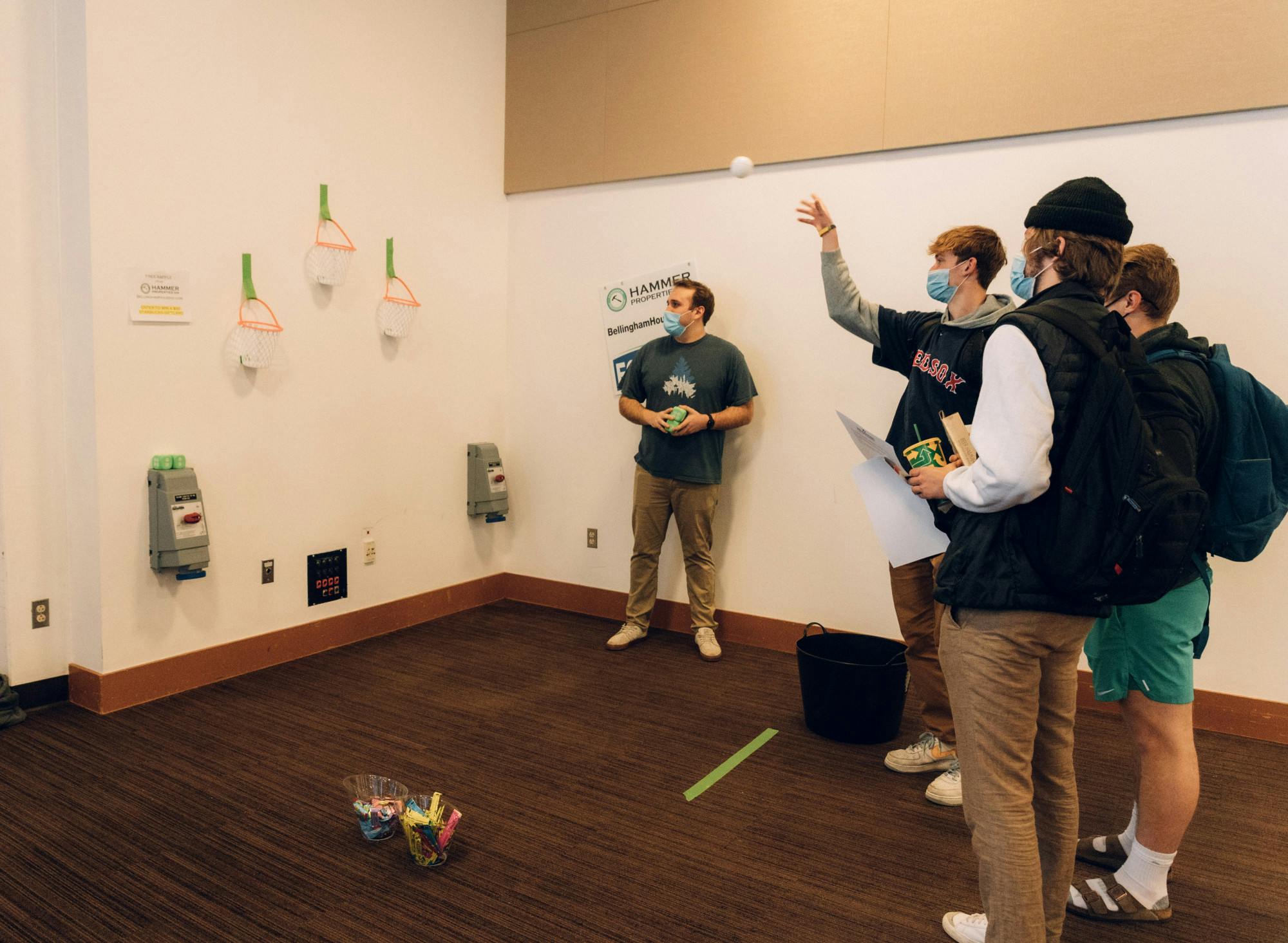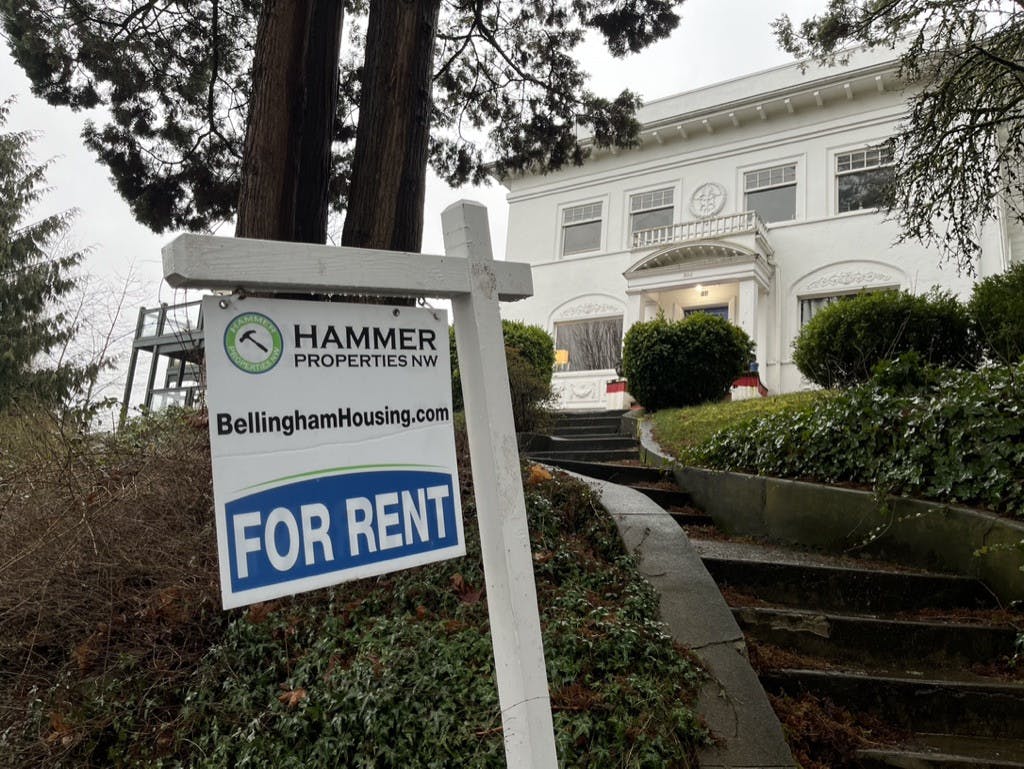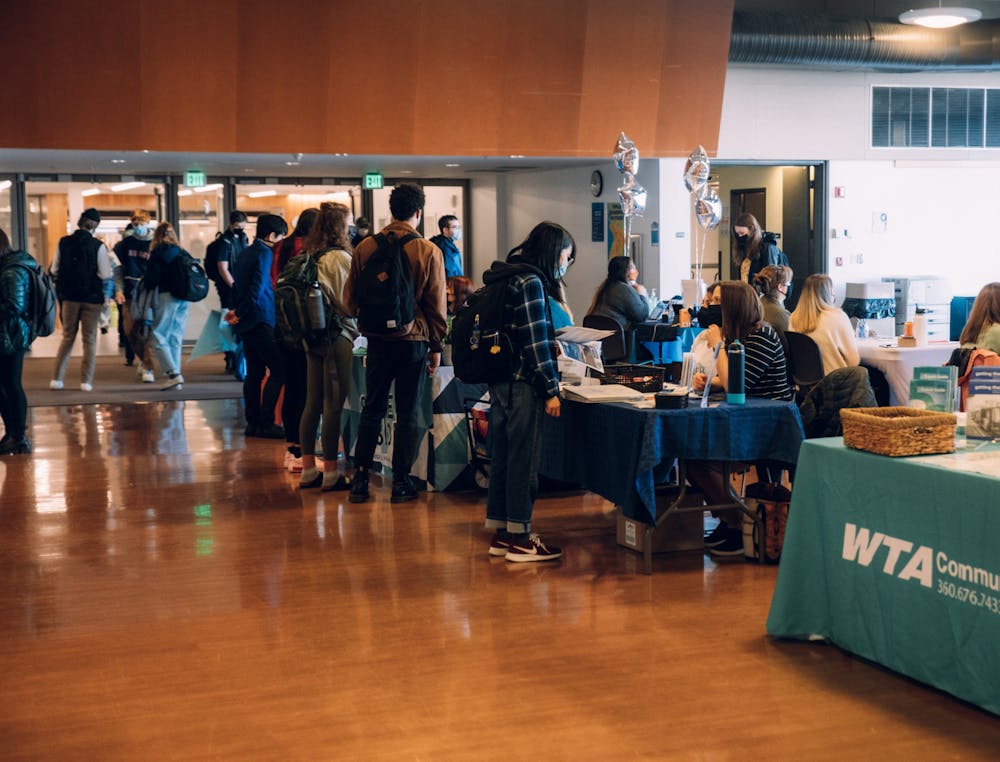Western Washington University students attended the off-campus housing fair in the Viking Union multipurpose room to learn about off-campus living opportunities and resources on March 3.
The office of Off-Campus Living hosted the housing fair with over 20 booths for students to visit. Among them were Chuckanut Property Management, the Community Food Co-Op, the Whatcom Dispute Resolution Center, Stateside apartments and more.
Julia Burns, the program manager for the office of Off-Campus Living, led the planning and implementation of the fair.

“Students can talk to landlords at the fair about what’s available, what prices are like, what the application process is like and what they’re going to need to apply,” Burns said. “Our hope is that students will really get a lot of their questions answered about how to even start the process.”
Third-year Elliot Faye attended the fair to learn about moving off campus for the first time. They were walking around with a bundle of pamphlets and handouts from various booths.
“It’s very crowded, so I’ll ask a couple questions at the booth and then I want to move on to let other people talk to them,” Faye said. “Now I have phone numbers to go off of, which is really what I wanted.”
Burns worked hard to gather a variety of property and utility management companies to attend the fair but wished more private landlords knew about their office and the event.
“Individual landlords can sometimes be really, really perfect matches for students,” Burns said. “They can often be a little bit more laid back and supportive, maybe a little bit less business-oriented.”
Lindsay Fulford, a Western graduate and leasing manager for Stateside apartments, said it is important for renters to find a landlord or property management company that works best for them. To do so, they should show up prepared.

“Stateside is a really amazing option for a lot of prospective renters, but I do think that going to every place and seeing it for yourself and how you feel about it is the best thing to do,” Fulford said. “Prepare a list of questions and try to take notes so you can come to a resolution and find the best spot for you.”
Preparing to live off-campus is a lot of work and gathering information is a necessary first step.
Fourth-year Isaac Rhodes, a graphic design student, has lived in two different off-campus houses. The first house was managed by a company and the second is owned by a private landlord. Rhodes learned a lot from both experiences.
“In our first house there were a lot of things we overlooked because we were 19 and just excited about living with friends and not in a dorm or in our parents’ houses,” Rhodes said. “I’ve realized it’s important to find somebody that’s an independent landlord and really assess if that person seems decent because you end up communicating with them a lot for however long you live there.”
Communication is a fundamental part of living off-campus. It is important between housemates and between tenants and landlords.
The Whatcom Dispute Resolution Center attended the off-campus housing fair to make its mediation and referral services known to future off-campus renters. Moonwater, the executive director of the WDRC, spoke about the Eviction Resolution Pilot Program that launched in October 2021.
“When eviction has the potential to be on the table, this program creates a pause point to connect tenants and landlords to available resources, whether that’s rental assistance or civil legal aid,” Moonwater said. “We are here to support people to connect to resources and have conversations in order to reach agreements that can stabilize housing for all.”
The WDRC also assists residents in Whatcom county with conflict prevention and intervention through supervised visitation, restorative justice practices and community education.
“Specific to our renters, I think a combination of our services would be of use,” Moonwater said. “Our trainings on how to communicate effectively and express what our needs and interests are in amicable and constructive ways can be very helpful and relevant in navigating relationships with tenants and landlords alike.”
Another resource that the office of off-campus living invited to the fair was Northwest Youth Services. Addison Ausley, the NWYS Whatcom Eviction Prevention coordinator, spoke about the assistance that NWYS provides for renters.
Ausley runs the Treasury Rental Assistance program. T-RAP is funded by the Washington State Department of Commerce and exists to prevent evictions and assist in rent and utility payments. Opportunity Council’s fiscal department works with NWYS to approve applications and send funds.
“A really nice thing about this program is that we can cover security deposits, first month’s rent and administrative fees,” Ausley said. “We can even cover parking fees and pet fees. If those are things that cannot be covered on your own, then we can be here to assist.”
To receive aid from T-RAP through Northwest Youth Services, a recipient must be between the ages of 18 and 24, living in Whatcom county, late on a payment to a landlord, experiencing a financial hardship due to COVID-19 and making less than the 80% of the area median income. For one person in Whatcom county, that means earning less than $45,450 in one year.
Western’s office of off-campus living understands and wants to assist with the challenges of planning for and living off-campus.
“Students may not really be aware that they’re eligible for assistance if anything bad were to happen,” Burns said. “So we want to make sure they know that there are resources out there for them.”
For more information about upcoming events or important housing resources, follow the office of off-campus living’s regularly updated Instagram page.

Annabelle Stefanoff (she/her) is majoring in Political Science and Economics and triple minoring in Spanish, news/ed journalism and honors interdisciplinary studies. When not reporting, she enjoys undertaking multi-day baking projects and reading a good book.






